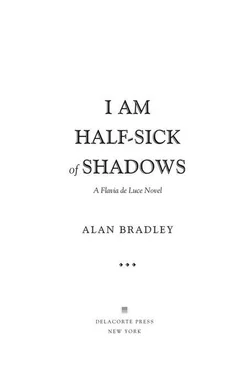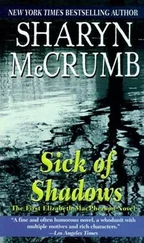Alan Bradley - I Am Half-Sick of Shadows
Здесь есть возможность читать онлайн «Alan Bradley - I Am Half-Sick of Shadows» весь текст электронной книги совершенно бесплатно (целиком полную версию без сокращений). В некоторых случаях можно слушать аудио, скачать через торрент в формате fb2 и присутствует краткое содержание. Жанр: Старинная литература, на английском языке. Описание произведения, (предисловие) а так же отзывы посетителей доступны на портале библиотеки ЛибКат.
- Название:I Am Half-Sick of Shadows
- Автор:
- Жанр:
- Год:неизвестен
- ISBN:нет данных
- Рейтинг книги:5 / 5. Голосов: 1
-
Избранное:Добавить в избранное
- Отзывы:
-
Ваша оценка:
- 100
- 1
- 2
- 3
- 4
- 5
I Am Half-Sick of Shadows: краткое содержание, описание и аннотация
Предлагаем к чтению аннотацию, описание, краткое содержание или предисловие (зависит от того, что написал сам автор книги «I Am Half-Sick of Shadows»). Если вы не нашли необходимую информацию о книге — напишите в комментариях, мы постараемся отыскать её.
I Am Half-Sick of Shadows — читать онлайн бесплатно полную книгу (весь текст) целиком
Ниже представлен текст книги, разбитый по страницам. Система сохранения места последней прочитанной страницы, позволяет с удобством читать онлайн бесплатно книгу «I Am Half-Sick of Shadows», без необходимости каждый раз заново искать на чём Вы остановились. Поставьте закладку, и сможете в любой момент перейти на страницу, на которой закончили чтение.
Интервал:
Закладка:
“You hadn’t spoken to her before that?”
“No,” Aunt Felicity said. “There had been no opportunity. One had come across her unexpectedly in the corridor, but as I’ve told you, we were both of us too well trained in the art of seeming total strangers.”
My mind was leapfrogging back and forth over the things that Aunt Felicity had told me. If, for instance, what she said was true, Phyllis Wyvern could not possibly have been arguing with someone when Auntie F got up to use the baffins, because she was already dead. I had heard the toilet flush and I’d been in the death chamber moments later. Before that, someone had had enough time to strangle Phyllis Wyvern, dress her in different clothing (for whatever bizarre reason), and make their escape through one of three doors: the one to the corridor, the one that connected to Flo and Maeve’s bedroom, or—and here I shot a nervous glance over my shoulder—the one that opened into the very room in which I was now standing. Aunt Felicity’s bedroom—the very same Aunt Felicity who had just told me that she was capable of coming for me in the dark with a butcher knife. If what she said was true—if only half of what she hinted at were the ramblings of a woman who had grown suddenly old at the end of the war—she was capable of anything. Who knew what havoc old loyalties and older jealousies could play with two women who had once been friends?
Or was it enemies?
I needed time to think—time to get away—to collect my thoughts.
“Thank you, Aunt Felicity,” I said. “You must be very tired.”
I could always come back to her later to fill in the blanks.
“You’re such a thoughtful child,” she said.
I gave her a modest smile.
The cupboard under the stairs was little more than a right-angled triangle equipped with a dangling lightbulb. Here, stowed safely away from the eyes of the ciné crew and their cameras, were the magazines that had been cleared away from the library and the drawing room. Back numbers of Country Life pressed down like geological strata upon old issues of The Illustrated London News . Heaped high with issues of Behind the Screen and Cinema Weekly , back numbers of Cinema World were piled in crooked stacks that must have dated back to the days of silent film.
I stepped inside, closed the door behind me, and, taking down the first handful of ciné magazines, began my search.
I flipped through page after page of Ciné Tit-Bits and Silver Cinema , smiling, at first, at the antics of the so-called “movie stars,” most of whom I had never heard of.
Parties, galas, premieres, benefit performances: smiling faces, toothy grins, top hats and sequined dresses, arms around shoulders in exotic motorcars—what vast amounts of time these people had spent having themselves photographed!
It wasn’t difficult to find Phyllis Wyvern. She was everywhere, spanning the years without apparently aging a day. Here she was, for instance, sitting, legs crossed, in a canvas chair with her name painted on the back, studying a script, with a cardigan thrown over her shoulders and a look of intense concentration on her face. Here she was, dancing with a young airman in a dark nightclub that seemed to be located in a church crypt. And here she was again, on the set of Anna of the Steppes , standing with another actress, their faces turned skyward, in front of one of the behemoth tractors as their makeup is retouched by a man in a mustache and a beret.
Could it be?
For a moment I thought that the woman beside Phyllis Wyvern was Marion Trodd. A much younger Marion Trodd, to be sure, but still …
In spite of my excitement I was having difficulty in keeping my eyes focused on the page. The air in the cupboard was becoming stuffy; the bare bulb giving off a surprising amount of heat. That and the fact that I was bone tired was making my head swim.
How long had I been huddled in this cupboard? An hour? Perhaps two? It seemed like days.
I rubbed my eyes with my fists, forcing myself to pay attention to the tiny type in which the caption was printed.
Perhaps there was something after all in Father’s insistence on having all of us outfitted with spectacles. I wore mine only when trying for sympathy, or when I needed to protect my eyes during a hazardous chemical experiment. I thought momentarily of running upstairs to get them, but decided against it.
I shook my head and read the caption again:
Phyllis Wyvern and Norma Durance freshen up between takes. Eyes front for the birdie, girls!
What a disappointment. I must have been mistaken. I had thought for a moment that I was on to something, but the name Norma Durance meant nothing to me.
Unless …
Hadn’t I seen that face a few issues back? Because the woman wasn’t photographed with Phyllis Wyvern I had paid her no attention.
I went back a couple of issues.
Yes! Here it was in Silver Cinema . The actress is in a barnyard, throwing a handful of grain from her gathered-up skirt to a mob of frenzied chickens.
“ Pretty Norma Durance ably undertakes the part of Dorita in The Little Red Hen. We hear she’s not working for chicken feed! ”
I held the magazine up to the light for a closer look. As I carefully studied the woman’s features, the top edge of the cover pressed for a moment against the lightbulb. In an instant the tinder-dry paper had browned, then blackened—and before I could blink, burst into flame.
It’s wonderful how the mind works in such situations. I remember distinctly that my first thought was “Here’s Flavia, her hands full of fire in a cupboard jam-packed with combustibles.”
It was the kind of thing of which front-page stories in the Times are made.
Smoldering ashes are all that remain of historic country house. Buckshaw in ruins .
And there would be a grisly photo, of course.
I threw down the burning magazine and stamped on it again and again with my feet.
But because of the waterproofing solution that Dogger applied so conscientiously to our footwear—a witches’ brew containing both linseed and castor oils, as well as copal varnish—my shoes burst immediately into flames.
I tore off my cardigan and dropped it onto my feet, stamping and bundling with my hands until the fire was out.
By now, my heart was pounding like a racing engine, and I found myself gasping for air.
Fortunately I had not burned myself. The fire had been quickly extinguished with little trace remaining other than a few black ashes and some lingering smoke.
I checked quickly to be sure that no sparks had lodged among the stacks of paper, then let myself out into the passageway, coughing as I went.
I was pulling on my singed sweater and scraping the toes of my smoking shoes on the floorboards when the kitchen door opened and Dogger appeared.
He looked at me closely without saying a word.
“Unforeseen chemical reaction,” I said.
An air of weariness had fallen upon the foyer. No one paid the slightest attention to me as I passed through. Everywhere, the people of Bishop’s Lacey sat staring blankly off into space, immersed in their own thoughts. In a corner, a card table with two chairs had been set up as an interrogation center, and Sergeant Graves was murmuring away with Miss Cool, the village postmistress and confectioner.
“Dazed” was the word for the rest of them. The earlier air of sharing in a jolly good adventure had worn off, pretense had vanished, and everyone had sagged, exhausted at last, into their real faces.
Buckshaw had been made over into a bomb shelter.
In the farthest corner from the police, the chauffeur, Anthony, sucked on a cigarette that he held concealed in a half-closed hand. He looked up and caught my eye, just as he had done when I’d dislodged the little avalanche of snow.
Читать дальшеИнтервал:
Закладка:
Похожие книги на «I Am Half-Sick of Shadows»
Представляем Вашему вниманию похожие книги на «I Am Half-Sick of Shadows» списком для выбора. Мы отобрали схожую по названию и смыслу литературу в надежде предоставить читателям больше вариантов отыскать новые, интересные, ещё непрочитанные произведения.
Обсуждение, отзывы о книге «I Am Half-Sick of Shadows» и просто собственные мнения читателей. Оставьте ваши комментарии, напишите, что Вы думаете о произведении, его смысле или главных героях. Укажите что конкретно понравилось, а что нет, и почему Вы так считаете.











